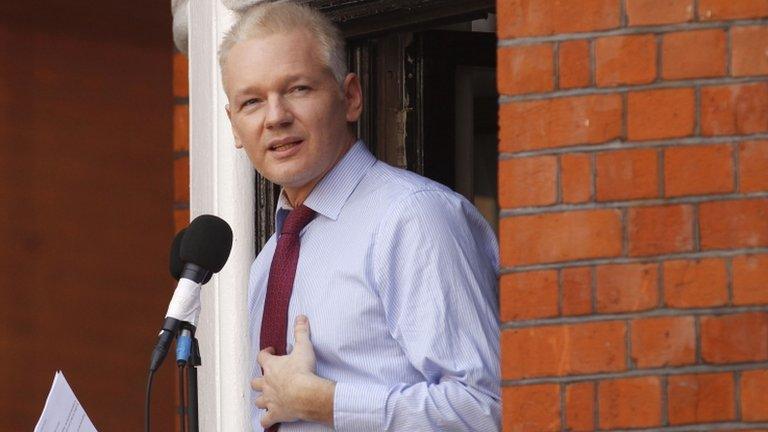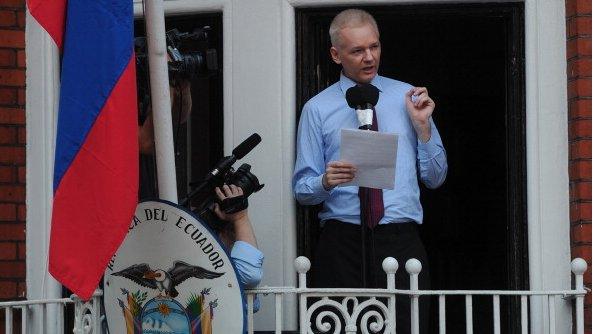Julian Assange: UK rejects death penalty claim
- Published

Mr Assange has been at Ecuador's London embassy since June
Claims Wikileaks founder Julian Assange could face the death penalty in the US are "without foundation", Foreign Secretary William Hague has indicated.
Ecuador has granted Mr Assange asylum as he fights extradition from the UK to Sweden over sex assault allegations.
Mr Hague told MPs the UK and Sweden would seek assurances about his human rights if a "third country" sought to try him for disclosing documents.
He called for further meetings with Ecuador to resolve the row.
Mr Assange, a 41-year-old Australian citizen, denies assaulting two women in Stockholm in 2010 and says the sex was consensual.
Death penalty safeguards
Swedish prosecutors, who want to question Mr Assange, have dismissed his claims that their case is part of a wider political move to see him stand trial in the US over his work with Wikileaks.
Mr Assange has said he fears he could face the death penalty if convicted in the US, but BBC correspondents say the Human Rights Act prevents the UK or Sweden from being able to extradite people for trial in countries where they could face such a sentence.
And in a written statement to Parliament, Mr Hague said: "As we have discussed with the government of Ecuador, the United Kingdom and Sweden robustly implement and adhere to the highest standards of human rights protection.
"The suggestion that Mr Assange's human rights would be put at risk by the possibility of onward extradition from Sweden to a third country is also without foundation...
"In practice, this means that the United Kingdom could only consent to Mr Assange's onward extradition from Sweden to a third country if satisfied that extradition would be compatible with his human rights, and that there was no prospect of a death sentence being imposed or carried out."
Supreme Court rejection
Mr Assange has been staying at Ecuador's London embassy since June.
The UK Supreme Court dismissed his bid to reopen his appeal against extradition and gave him a two-week grace period - during which he entered the embassy in Knightsbridge, west London - before proceedings could start.
Mr Hague said suggestions that extradition to Sweden posed a risk to Assange's human rights were also "completely unfounded" and had been "comprehensively rejected" by UK courts.
He added there was "no legal basis" for the government to accept Ecuador's decision to grant Mr Assange asylum and allow him safe passage out of the UK.
The foreign secretary said there had been seven formal discussions as well as many other conversations and written exchanges with Ecuador in an attempt to reach an acceptable resolution.
Most recently, Mr Hague had a meeting with Ecuador's Vice-President, Lenin Moreno, on 29 August in London, during his visit to the Paralympics.
Mr Hague said: "We wish to continue our dialogue with the government of Ecuador. We believe that our two countries should be able to find a diplomatic solution.
"We have invited the government of Ecuador to resume, as early as possible, the discussions we have held on this matter to date."
A spokesman for the Ecuadorian government in London said Mr Hague's statement only partially addressed its concerns and did not "specifically" refer to the US.
"While we accept that there are provisions in the European Human Rights Convention that stops the extradition of a suspect if they face the death penalty, what the UK government have failed to address over the last three months, including today, is the inhumane treatment that Mr Assange would face were he to be extradited to the USA, including solitary confinement for 23 hours a day, limited access to legal representatives and punitive sentencing should he be found guilty in a military of special court," he said.
"If the UK provided these basic human rights guarantees then we believe that there would be a quick, fair and honourable solution to the present impasse."
- Published13 March 2015

- Published31 August 2012

- Published30 August 2012

- Published24 August 2012

- Published25 August 2012
